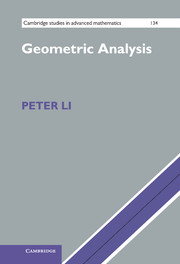Book contents
- Frontmatter
- Contents
- Preface
- 1 First and second variational formulas for area
- 2 Volume comparison theorem
- 3 Bochner–Weitzenböck formulas
- 4 Laplacian comparison theorem
- 5 Poincaré inequality and the first eigenvalue
- 6 Gradient estimate and Harnack inequality
- 7 Mean value inequality
- 8 Reilly's formula and applications
- 9 Isoperimetric inequalities and Sobolev inequalities
- 10 The heat equation
- 11 Properties and estimates of the heat kernel
- 12 Gradient estimate and Harnack inequality for the heat equation
- 13 Upper and lower bounds for the heat kernel
- 14 Sobolev inequality, Poincaré inequality and parabolic mean value inequality
- 15 Uniqueness and the maximum principle for the heat equation
- 16 Large time behavior of the heat kernel
- 17 Green's function
- 18 Measured Neumann Poincaré inequality and measured Sobolev inequality
- 19 Parabolic Harnack inequality and regularity theory
- 20 Parabolicity
- 21 Harmonic functions and ends
- 22 Manifolds with positive spectrum
- 23 Manifolds with Ricci curvature bounded from below
- 24 Manifolds with finite volume
- 25 Stability of minimal hypersurfaces in a 3-manifold
- 26 Stability of minimal hypersurfaces in a higher dimensional manifold
- 27 Linear growth harmonic functions
- 28 Polynomial growth harmonic functions
- 29 Lq harmonic functions
- 30 Mean value constant, Liouville property, and minimal submanifolds
- 31 Massive sets
- 32 The structure of harmonic maps into a Cartan–Hadamard manifold
- Appendix A Computation of warped product metrics
- Appendix B Polynomial growth harmonic functions on Euclidean space
- References
- Index
19 - Parabolic Harnack inequality and regularity theory
Published online by Cambridge University Press: 05 June 2012
- Frontmatter
- Contents
- Preface
- 1 First and second variational formulas for area
- 2 Volume comparison theorem
- 3 Bochner–Weitzenböck formulas
- 4 Laplacian comparison theorem
- 5 Poincaré inequality and the first eigenvalue
- 6 Gradient estimate and Harnack inequality
- 7 Mean value inequality
- 8 Reilly's formula and applications
- 9 Isoperimetric inequalities and Sobolev inequalities
- 10 The heat equation
- 11 Properties and estimates of the heat kernel
- 12 Gradient estimate and Harnack inequality for the heat equation
- 13 Upper and lower bounds for the heat kernel
- 14 Sobolev inequality, Poincaré inequality and parabolic mean value inequality
- 15 Uniqueness and the maximum principle for the heat equation
- 16 Large time behavior of the heat kernel
- 17 Green's function
- 18 Measured Neumann Poincaré inequality and measured Sobolev inequality
- 19 Parabolic Harnack inequality and regularity theory
- 20 Parabolicity
- 21 Harmonic functions and ends
- 22 Manifolds with positive spectrum
- 23 Manifolds with Ricci curvature bounded from below
- 24 Manifolds with finite volume
- 25 Stability of minimal hypersurfaces in a 3-manifold
- 26 Stability of minimal hypersurfaces in a higher dimensional manifold
- 27 Linear growth harmonic functions
- 28 Polynomial growth harmonic functions
- 29 Lq harmonic functions
- 30 Mean value constant, Liouville property, and minimal submanifolds
- 31 Massive sets
- 32 The structure of harmonic maps into a Cartan–Hadamard manifold
- Appendix A Computation of warped product metrics
- Appendix B Polynomial growth harmonic functions on Euclidean space
- References
- Index
Summary
In this chapter, we will present Moser's version of the Nash–Mosers Harnack inequality for parabolic equations. The elliptic version (also proved by De Giorgi) can be considered as a special case when the solution is time independent. The iteration procedure of Moser was particularly useful in the theory of geometric analysis. We will attempt to cover this in as much generality as possible while keeping explicit account of the dependency of various geometric and analytic constants. In applying this type of argument in the study of geometric partial differential equations, often the explicit geometric dependency is crucial. As a result of these estimates, one derives a mean value inequality for nonnegative subsolutions and a Harnack inequality for positive solutions of a fairly general class of parabolic operators. In particular, it gives a Cα estimate for solutions of any second order parabolic (elliptic) operators of divergence form with only measurable coefficients. This regularity result was the original motivation for the development of this theory. We shall point out that the mean value inequality and the Harnack inequality derived from this argument are applicable to a more general class of equations, while the ones given in earlier chapters yield stronger results but require more smoothness from the operator. Both approaches are important in the theory of geometric analysis, but they are suited to different types of situation. The following account is a slightly modified version of Moser's argument that has been adapted to a more geometrical setting.
- Type
- Chapter
- Information
- Geometric Analysis , pp. 216 - 240Publisher: Cambridge University PressPrint publication year: 2012



